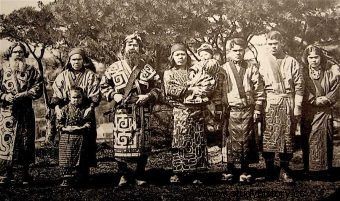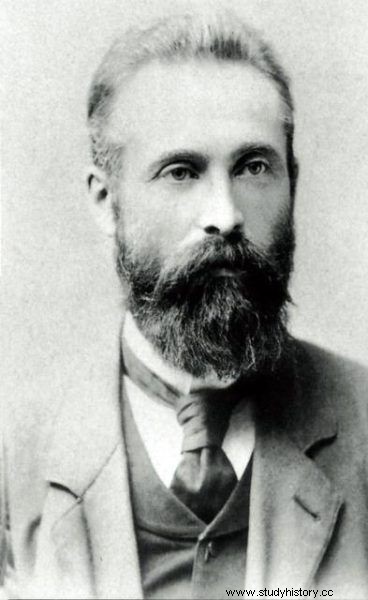On May 17, 1918, the body of a middle-aged man was fished from the Seine. In his pocket he had documents which showed that the deceased was Bronisław Ginet-Piłsudski. The official cause of death was suicide. But did Józef Piłsudski's older brother really take his own life?
In Poland, hardly anyone remembers about its existence. Meanwhile, monuments are erected for him in Japan and he is considered a national hero. His grandson, Kazuyasu Kimura, the last male descendant of the Piłsudski family lives there.

Bronisław and Józef Piłsudscy 1885
Why, then, in his homeland, Bronisław remains in the shadow of his younger brother to this day? After all, his scientific achievements were as valuable as the independence activities of Ziuk. What's more, the older of the Piłsudski brothers led an equally turbulent and remarkable life, and the circumstances of his death are still controversial .
King of "hairy people"
Bronisław Piłsudski is a mysterious figure even today. The surviving members of his family admit that no one knew the details of the fate of his older brother Józef. It is known that he dreamed of a career as a lawyer, but fate decided that he became an ethnographer. Lew Sternberg, whom he met in exile, persuaded him to do so.
Piłsudski was arrested in March 1887 for taking part in the preparations for the assassination attempt on Tsar Alexander III. Initially he was sentenced to death, but eventually his sentence was changed to 15 years of exile to Sakhalin . It was there that he became interested in the local cultures of the Gilak, Oroka and - above all - Ainu cultures. Małgorzata Stępka reports:
Piłsudski stayed in Sakhalin until 1905. He gained the authority and trust of the local tribes, especially the Ainu. Anyway, he was accepted as a member of this tribe, which also allowed him to conduct more in-depth research. Married to an Ainu woman, he could now observe his own family, as it were.
"Hairy people" - as the Ainu used to say, even made him their king (though it was only a nickname, not an official title). It is hardly surprising for them. Bronisław Piłsudski did a lot for the local tribes during his exile. As he himself reported:“I treated them, vaccinated smallpox. I taught them to read and write, because there are no schools for natives. I was their interpreter and advocate for the authorities. ”

Bronisław Piłsudski - King of Ainu
He traveled a lot around the island. He founded several schools and a library. He also prepared a draft of administrative regulations. His greatest achievement, however, was to save the Ainu language from extinction - prepared a dictionary containing over 10,000 words, and on 100 wax rollers for Edison's phonograph he recorded priceless samples of tribal speech and singing.
The mysterious death of Piłsudski
With his wife Chuhsamma, he had two children, son Sukezo and daughter Kiyo, born in 1903. He never met a girl. When his partner was in the second pregnancy, he left for Japan (the tribal authorities did not agree to the family accompanying him - the woman's leaving the village was treated as a disgrace). Eight months later he was forced to return to Poland. As Jerzy Chociłowski reports:
Bronisław's hopeful return to his homeland after nineteen years of wandering - he was bitterly disappointed. Whether in Krakow or Lviv, he was indifferent to him. Nobody cared about his knowledge.
He dreamed of a job as an academic teacher, but he had insufficient education for it. So he took up various, poorly paid jobs. After the outbreak of the war through Austria, he got to Switzerland. Eventually he settled in Paris.
In the next forced exile, he was not happy. Chociłowski describes:“The states of animation are intertwined with apathy, euphoria with depression. His depression also stems from his painful loneliness. He complained about the lack of a woman by his side. ”
He had had episodes of depression before. Bronisław Piłsudski dealt with extreme situations much worse than his younger brother. In the novel "Akan", inspired by the fate of the ethnographer, Paweł Goźliński describes what such attacks could have looked like:
His breathing was ragged, with irregular pauses. I did not notice any other signs of awareness. Emotions also do not. This was the first time I saw him like this. Not the last. He went out, but didn't become indifferent. He looked like someone resigned to defeat.
His body froze in a pose that he had to learn in the deepest darkness. He pressed his head into his arms as if to save her from the flood of memories. He cringed so pain had as little access to him as possible. Probably like in a cell the night before the execution and under the deck of a floating prison.

Bronisław Piłsudski
Bouts of anxiety and fear, and persecution mania, and possibly narcolepsy, which he eventually developed over time, eventually led him to suicide - or so the official sources say.
However, not everyone agrees as to the circumstances in which the future marshal's older brother died. According to some, it was an unfortunate accident, others still have narrow involvement in the case of third parties. After all, Piłsudski bore a "dangerous" surname, still associated with Ziuk's revolutionary activities. How was it really? We will probably never know that.
Inspiration:
- Paweł Goźliński, Akan. A novel about Bronisław Piłsudski, Agora 2019.
Bibliography:
- Jerzy Chociłowski, Bronisław Piłsudski's duel with fate, Iskry 2018.
- Janusz R. Kowalczyk, Bronisław Piłsudski - with a phonograph among the Ainu , Culture.pl (accessed on September 28, 2019).
- Małgorzata Stępka, Bronisław Piłsudski. The fate of the "King of Ainu" , "Nowy Dziennik" 4–5.12.1999.
